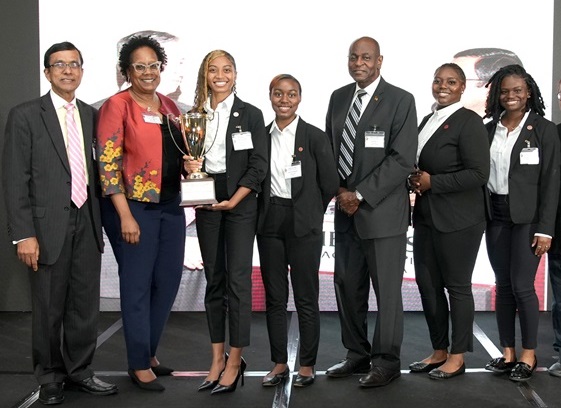OFFICIAL RULES
Business Plan Competition
Important Dates:
Please block your calendar:
April 16-19, 2026.
Faculty Advisor Name and
School Participation Registration Due: August 31st, 2025
Internal business plan competition
should be completed by November 15, 2025.
Student Team Members Names Due
to the Program Office by November 22,
2025
Early submissions are encouraged
and welcomed.
Final Written Business Plans Document (pdf version only via email) due by February 5, 2026
GENERAL
RULES
- A team should have a minimum of four and maximum of ten CURRENT STUDENT members with a minimum GPA of 3.3 and must have a faculty advisor. Each school can send additional faculty advisors. Please note that the program will only pay for one faculty advisor and the school must pay for the additional additional faculty advisors (a subsidized rate of $1,350 per faculty advisor).
- Current students may include any student from campus
(Freshman, Sophomore, Junior, Senior or Graduate Student).
- Non-students may be members of the management team
and participate in planning the venture; however, only five students may
present the plan and answer questions from the judges.
- Each school is allowed to bring up to 10 students to
Atlanta. Please note that the program will only pay for up to 5 students
and the school must pay for the additional students (a subsidized rate of $1,000 per student).
- Students must think big and ask for at least $500k
investment from potential investors.
- Students are free to develop business plans based on
any viable business opportunities. However, they are encouraged to exploit
available technology applicable to that business.
OFFICIAL RULES,
GUIDELINES AND SUBMISSION REQUIREMENTS
Eligibility
- All ventures must be seeking outside equity capital.
- The competition is for students
enrolled in the current academic year, September 1 through August 31.
Students who graduated in the preceding academic semester are not eligible
to participate.
- The competition is for student created, managed and
owned ventures. In other words, students are to have played a major role
in conceiving the venture, to have key management roles and to own
significant equity. An equity position of less than 20% will be suspected
and require the students to show evidence that they were a major cause in
the venture creation. One objective of this rule is to exclude ventures
formed and managed by non-students who have given token equity to MBAs for
writing their business plan.
- Ventures with revenues in prior academic years are
excluded. The history of a team member working on an idea or new
technology in previous academic years or even prior to entering graduate
school does not exclude a venture, if there were no revenues prior to the
current academic year.
- The business plan must represent
the original work of members of the team and be prepared under faculty
supervision; ideally, the business plan will be prepared for credit in a
regularly scheduled course or as an independent study.
Written Business Plan
- Plans must be limited to 25 (typed and double-spaced) pages of text, including the executive summary and summary financial data. Detailed spreadsheets and appropriate appendices should follow the text portion of the plan. In total, the plan should be no longer than 40 pages.
- Financial
data should include a cash flow statement, income statement, and balance
sheet. Include an explanation of the offering to investors indicating how
much money is required and how it will be used. Also, delineate the
possible exit strategies.
- Appendices
should be included only when they support the findings, statements and
observations in the plan. Because of the number of teams in the
competition, judges may not be able to read all the appendices. Therefore, the text portion
of the plan (25 pages) must contain all pertinent information in a clear
and concise manner.
- Judges will
use the three-part Judge's Evaluation Form. Part I (valued at 40%) is
designed to help assess the written business plan focusing on key elements
and the effectiveness of the summary financial data. Part II (20%)
assesses the poise and professionalism of the presentation. Part III (40%)
evaluates the perceived viability of the venture. This quantitative
assessment is meant to complement, not replace, the qualitative evaluation
of the judges in their determination of winners.
- Use the Judge's Evaluation Form as a useful guide for structuring the business plan.
- Presentation
- The
presentation is in two parts. In the Opening and Final Round, each team
will have 15 minutes to present its plan. THIS TIME LIMIT WILL BE STRICTLY
ENFORCED
- The
presentation will be followed by a 15-minute question-and-answer session in
the first round and 20 minutes in the final round with the judges. Each
presenting team will have approximately 5 minutes for set-up.
- Each
member of the team must participate in the formal presentation of the
plan. In the opening round, no student team member is allowed to observe
any other
presentations. Deans and faculty
advisors are free to observe any presentation with the understanding that they
will not discuss this with the student team members until after the final
round.
- On Saturday, there will be feedback sessions by the
judges in each track. Each team will get fifteen minutes with the judges
to receive feedback. Judges will return the written plans and evaluation
forms to the teams. The session is subject to the terms that advisor and
students can only ask judges for clarification but cannot argue with the
judges.

